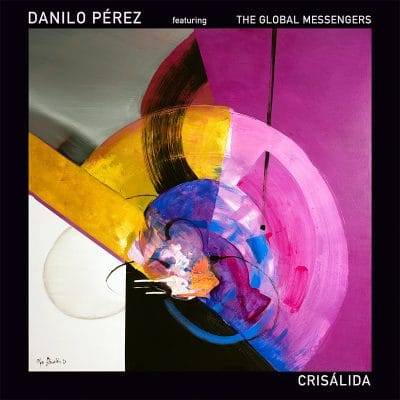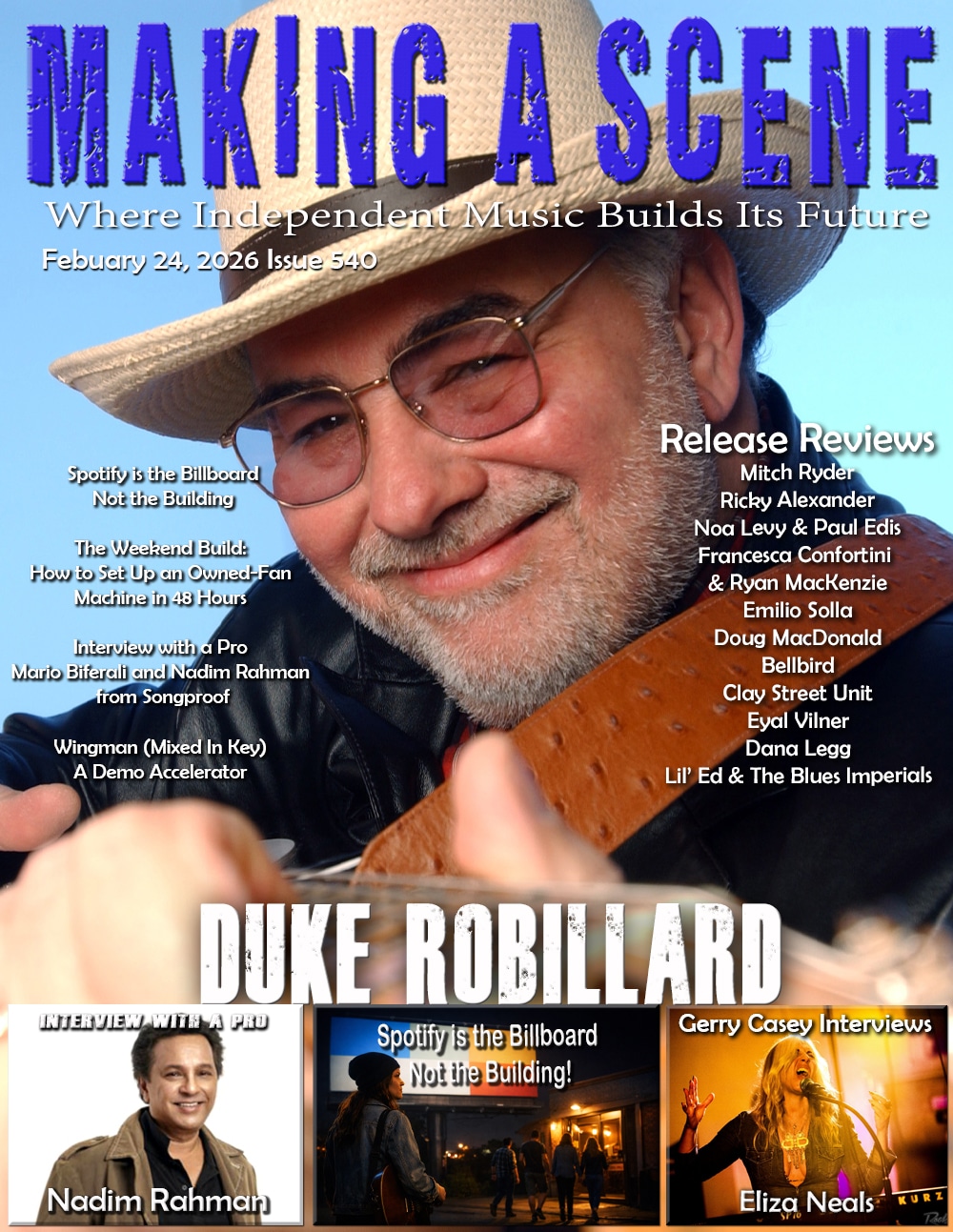Danilo Perez Crisalida
 Danilo Perez
Danilo Perez
Crisalida
Mack Avenue
The GRAMMY-winning pianist, composer, educator, and longtime member of The Wayne Shorter Quartet, Panamanian Danilo Perez, delivers essentially an idealistic world music effort imbued with Latin, classical chamber music, jazz improvisations (mostly his) and choral strains via his new band, The Global Messengers. This is very different sounding album than any we have covered on these pages, a genre blurring work with the loftiest of goals. The title translates to “chrysalis’ in English. Perez comments on the theme of the album, “I envision Crisálida as a protected space where we all come together, whether we’re addressing immigration issues, climate change, environmental justice, science, interconnecting different art forms. We need to work together to build our new crisálida, which, to me, is the emotional, mental and physical state of protection in our early development.”
The album features two gripping suites – the album’s four-part “La Muralla (Glass Walls) Suite” in first half, and the four-part “Fronteras (Borders) Suite” in the second. with the newly formed Global Messengers, consisting of alumni from Berklee College of Music’s Global Jazz Institute. Like Dizzy Gillespie’s United Nations Orchestra, which helped launched Pérez’s international career, the Global Messengers is a multicultural combo that features percussionist Tareq Rantisi (Palestine), laouto player Vasilis Kostas (Greece), violinist and vocalist Layth Sidiq (Iraq, Jordan), cellist Naseem Alatrash (Palestine) and singer Farayi Malek (United States). Guest appearing on several cuts are batá drummer Román Diaz (Cuba), Ney flutist Faris Ishaq (Palestine), Zárate (Chile), singer Eirini Tornesaki (Greece) and the Kalesma Children’s Choir of The Ark of the World (Kivotos tou Kosmou) (based in Greece).
The “La Muralla (Glass Walls) Suite” begins in tranquil fashion with the gorgeous “Rise from Love,” which features uplifting vocals from Malek along with Kalesma Children’s Choir of The Ark of the World. Pérez’s suspenseful piano improvisation changes the tenor of the tune along with Diaz’s surging batá rhythms, as stirring, lively strings ebb and flow, symbolizing Africa’s arrival to the Western world and worldwide influence on music. The Greek instrument, laouto, played by Kostas, engages with Perez in the opening to “Monopatia(Pathways)” before we gradually hear the strings as well as Zárate’s arresting spoken-word and Tornesaki’s poignant singing connecting in just one piece, representative music from Middle East and the Mediterranean as well African and Latin American strains.
Rantini’s driving percussion introduction signals a growing sense of urgency in “Calling for the Dawn.” by a triumphant As Malek and Sidiq deliver the spirited melody over Pérez’s animated statements and surging rhythmic underpinning, by Malek jumps in, asking, “Where are we going? Is it up or down?” Pérez explains, “It’s a call to the divine. It’s a warning that if we mess with nature and the environment, then we are responsible for what comes afterward.” In closing “La Muralla (Glass Walls) Suite,” the final movement, “Muropatía,” begins with an intricate rhythm, based upon a folkloric Panamanian dance that Pérez discovered had very striking similarities to some of Palestine’s folkloric rhythms. This is the most frenetic piece among the four, with the leader’s piano accompaniment anchoring a bubbling mix of strings, vocals, and percussion.
The “Fronteras (Borders) Suite” was based, in part, by a series of Perez’s dreams, touching upon the emotional aspects of immigration. It begins with the somber “Adrift,” which has Malek singing her lyrics about the story of a mother seeking to reunite with her daughter after twenty years of separation. While is tempting to think of the U.S, border in this context, the themes share a global perspective. Alatrash plays a dramatic cello in the epic “Al-Musafir Blues,” expressing a sense of determination of a Palestinian man trying to travel to the U.S. to study, dealing with immigration delays at the airport. The piece later evolves into a lengthy Perez improvisation, imbued by snappy percussion and strings. Perez comments, “…I wanted to find a connection and understanding to the blues from another perspective. We need to understand that the blues were created by African Americans – but also that its values and concepts can connect with other cultures. I’m trying to create this musical space where the blues can be the connector in which worldly sounds emerge.”
“Kalesma (True Calling)” begins with a faint violin melody to the gradually unfolding piece where a laouto melody and vocals transform it into a rather haunting tone to signify what Perez feels is our current world humanitarian crisis. This suite then ends with the energetic “Unknown Destination,” a composition that begins casually as Pérez comps inventively with the strings and vocals to Rantisi’s percolating rhythms. The piece becomes both dynamic and more cohesive as the Global Messengers build it to a triumphant climax.
Perez’s Crisálida is a stirring work, bridging generations and cultures, leaving an indelible imprint.
- Jim Hynes
Buy Us a Cup of Coffee!
Join the movement in supporting Making a Scene, the premier independent resource for both emerging musicians and the dedicated fans who champion them.
We showcase this vibrant community that celebrates the raw talent and creative spirit driving the music industry forward. From insightful articles and in-depth interviews to exclusive content and insider tips, Making a Scene empowers artists to thrive and fans to discover their next favorite sound.
Together, let’s amplify the voices of independent musicians and forge unforgettable connections through the power of music
Make a one-time donation
Make a monthly donation
Make a yearly donation
Buy us a cup of Coffee!
Or enter a custom amount
Your contribution is appreciated.
Your contribution is appreciated.
Your contribution is appreciated.
DonateDonate monthlyDonate yearlyYou can donate directly through Paypal!
Subscribe to Our Newsletter
Order the New Book From Making a Scene
Breaking Chains – Navigating the Decentralized Music Industry
Breaking Chains is a groundbreaking guide for independent musicians ready to take control of their careers in the rapidly evolving world of decentralized music. From blockchain-powered royalties to NFTs, DAOs, and smart contracts, this book breaks down complex Web3 concepts into practical strategies that help artists earn more, connect directly with fans, and retain creative freedom. With real-world examples, platform recommendations, and step-by-step guidance, it empowers musicians to bypass traditional gatekeepers and build sustainable careers on their own terms.
More than just a tech manual, Breaking Chains explores the bigger picture—how decentralization can rebuild the music industry’s middle class, strengthen local economies, and transform fans into stakeholders in an artist’s journey. Whether you’re an emerging musician, a veteran indie artist, or a curious fan of the next music revolution, this book is your roadmap to the future of fair, transparent, and community-driven music.
Get your Limited Edition Signed and Numbered (Only 50 copies Available) Free Shipping Included
Discover more from Making A Scene!
Subscribe to get the latest posts sent to your email.








